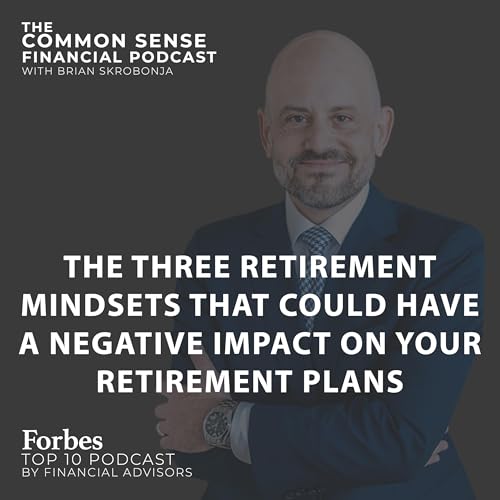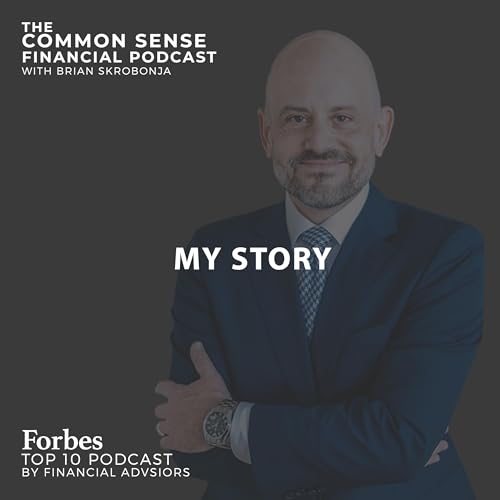In this podcast episode, Brian shares his remarkable journey from his parents' middle-class immigrant background to achieving financial freedom through decades of learning and building businesses. He recounts his early aspiration for an opulent lifestyle and the pivotal moment when he realized the importance of creating income-producing assets. Through content creation, including three books and the Common Sense Financial Podcast, Brian's financial wisdom and expertise have garnered recognition and awards, providing valuable insights into wealth, financial freedom, and the pursuit of life's true riches. Join us as we explore Brian's wealth-building principles, the significance of faith, family, and relationships, and the pursuit of genuine financial freedom. It was over 30 years ago when Brian got started in business and he's spent this time building his knowledge while building teams and companies.Brian begins by telling the story of his parents and how they came over from Croatia and lived a middle-class life.His father worked evenings and weekends as a lab engineer while also running a business on the side. His work ethic greatly inspired Brian as he grew up.As a teen, he always dreamed of having expensive things, but his only model for getting that done involved trading time for money, which is exactly what he did throughout his early 20's. This led to him working harder to keep up with his increasingly expensive lifestyle.After doing it wrong for years, Brian had an epiphany where he realized he needed to create income-producing assets that would pay for his lifestyle.He set out to create a passive income stream to support his lifestyle and successfully accomplished it. That's when his focus for what he was really trying to do for his clients came into clarity.Brian began producing content back in 2010. And out of that came three books: Common Sense, Generational Planning, and Retirement Planning, which can all be found on Amazon.This led to the beginning of the Common Sense Financial Podcast, which has since been recognized by Forbes as a top 10 podcast by financial advisors. Brian also became a regular contributor for Kiplinger magazine locally in St. Louis. He's gone on to win numerous awards for his work.After 30 years of helping clients create the passive income they need to create real financial freedom, Brian regularly hears clients say that his process has really opened their eyes about how money works and how to think about wealth.In his personal life, Brian has been married to his wife Carrie for 30 years and has three kids, who have also grown up and had families of their own.Throughout their lives, Brian and his wife have taught their children two main things. First, most importantly, for them to pursue a close personal relationship with Jesus Christ and to live out their faith in their daily walk. Second to that, is to understand that a worthy pursuit in life is the things money can't buy: building relationships, investing, and creating memories and experiences with people that you love.A key lesson that took Brian a long time to figure out is that the pursuit of things never brings satisfaction.Real wealth is not found in things but in the freedom to live your life free from having to work for a paycheck or trade your time for money, which is another lesson he tries to impart to his kids as well as his clients. Mentioned in this episode: BrianSkrobonja.com Common Sense Financial Podcast on YouTube Common Sense Financial Podcast on Spotify SkrobonjaFinancial.com SkrobonjaWealth.com BuildBanking.com Common Sense: YOUR Guide to Making Smart Choices with YOUR Money by Brian Skrobonja Generational Planning by Brian Skrobonja Retirement Planning: Have A Plan So You Can Live Your Life by Brian Skrobonja Investing involves risk, including the potential loss of principal. This is intended for informational purposes only. It is not intended to be used as the sole basis for financial decisions, nor should it be construed as advice designed to meet the particular needs of an individual's situation. Securities offered only by duly registered individuals through Madison Avenue Securities, LLC. (MAS), Member FINRA &SIPC. Advisory services offered only by duly registered individuals through Skrobonja Wealth Management (SWM), a registered investment advisor. Tax services offered only through Skrobonja Tax Consulting. MAS does not offer Build Banking or tax advice. Skrobonja Financial Group, LLC, Skrobonja Wealth Management, LLC, Skrobonja Insurance Services, LLC, Skrobonja Tax Consulting, and Build Banking are not affiliated with MAS. Skrobonja Wealth Management, LLC is a registered investment adviser. Advisory services are only offered to clients or prospective clients where Skrobonja Wealth Management, LLC and its representatives are properly licensed or exempt from licensure. The firm is a registered investment adviser with the state of Missouri, and may only transact business with ...
Más
Menos
 Dec 31 202511 m
Dec 31 202511 m 18 m
18 m 16 m
16 m Dec 10 202519 m
Dec 10 202519 m 42 m
42 m Nov 26 202511 m
Nov 26 202511 m Nov 19 202516 m
Nov 19 202516 m 13 m
13 m
